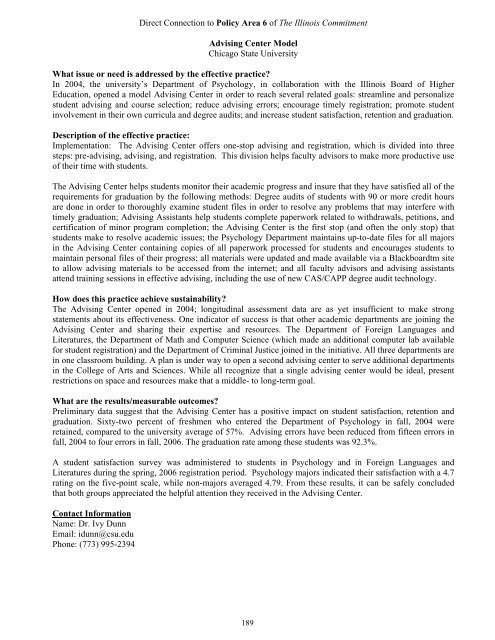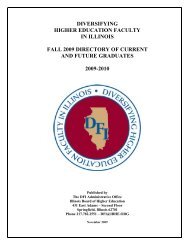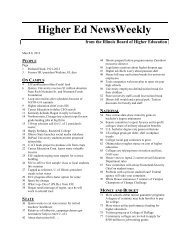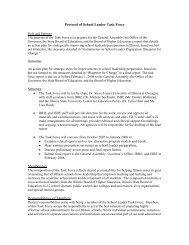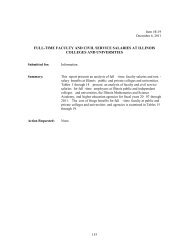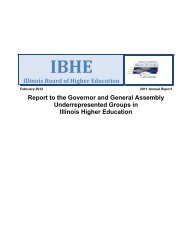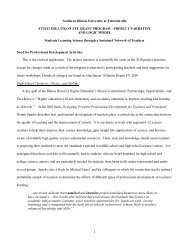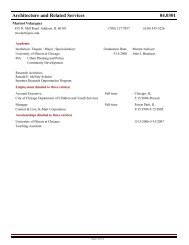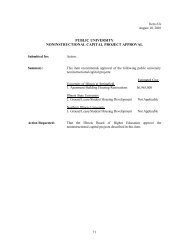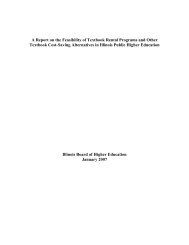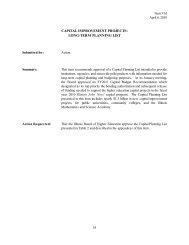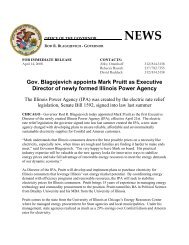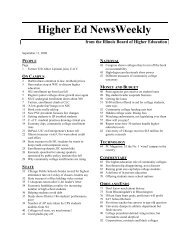Title of Effective Practice: - California Postsecondary Education ...
Title of Effective Practice: - California Postsecondary Education ...
Title of Effective Practice: - California Postsecondary Education ...
Create successful ePaper yourself
Turn your PDF publications into a flip-book with our unique Google optimized e-Paper software.
Direct Connection to Policy Area 6 <strong>of</strong> The Illinois Commitment<br />
Advising Center Model<br />
Chicago State University<br />
What issue or need is addressed by the effective practice?<br />
In 2004, the university’s Department <strong>of</strong> Psychology, in collaboration with the Illinois Board <strong>of</strong> Higher<br />
<strong>Education</strong>, opened a model Advising Center in order to reach several related goals: streamline and personalize<br />
student advising and course selection; reduce advising errors; encourage timely registration; promote student<br />
involvement in their own curricula and degree audits; and increase student satisfaction, retention and graduation.<br />
Description <strong>of</strong> the effective practice:<br />
Implementation: The Advising Center <strong>of</strong>fers one-stop advising and registration, which is divided into three<br />
steps: pre-advising, advising, and registration. This division helps faculty advisors to make more productive use<br />
<strong>of</strong> their time with students.<br />
The Advising Center helps students monitor their academic progress and insure that they have satisfied all <strong>of</strong> the<br />
requirements for graduation by the following methods: Degree audits <strong>of</strong> students with 90 or more credit hours<br />
are done in order to thoroughly examine student files in order to resolve any problems that may interfere with<br />
timely graduation; Advising Assistants help students complete paperwork related to withdrawals, petitions, and<br />
certification <strong>of</strong> minor program completion; the Advising Center is the first stop (and <strong>of</strong>ten the only stop) that<br />
students make to resolve academic issues; the Psychology Department maintains up-to-date files for all majors<br />
in the Advising Center containing copies <strong>of</strong> all paperwork processed for students and encourages students to<br />
maintain personal files <strong>of</strong> their progress; all materials were updated and made available via a Blackboardtm site<br />
to allow advising materials to be accessed from the internet; and all faculty advisors and advising assistants<br />
attend training sessions in effective advising, including the use <strong>of</strong> new CAS/CAPP degree audit technology.<br />
How does this practice achieve sustainability?<br />
The Advising Center opened in 2004; longitudinal assessment data are as yet insufficient to make strong<br />
statements about its effectiveness. One indicator <strong>of</strong> success is that other academic departments are joining the<br />
Advising Center and sharing their expertise and resources. The Department <strong>of</strong> Foreign Languages and<br />
Literatures, the Department <strong>of</strong> Math and Computer Science (which made an additional computer lab available<br />
for student registration) and the Department <strong>of</strong> Criminal Justice joined in the initiative. All three departments are<br />
in one classroom building. A plan is under way to open a second advising center to serve additional departments<br />
in the College <strong>of</strong> Arts and Sciences. While all recognize that a single advising center would be ideal, present<br />
restrictions on space and resources make that a middle- to long-term goal.<br />
What are the results/measurable outcomes?<br />
Preliminary data suggest that the Advising Center has a positive impact on student satisfaction, retention and<br />
graduation. Sixty-two percent <strong>of</strong> freshmen who entered the Department <strong>of</strong> Psychology in fall, 2004 were<br />
retained, compared to the university average <strong>of</strong> 57%. Advising errors have been reduced from fifteen errors in<br />
fall, 2004 to four errors in fall, 2006. The graduation rate among these students was 92.3%.<br />
A student satisfaction survey was administered to students in Psychology and in Foreign Languages and<br />
Literatures during the spring, 2006 registration period. Psychology majors indicated their satisfaction with a 4.7<br />
rating on the five-point scale, while non-majors averaged 4.79. From these results, it can be safely concluded<br />
that both groups appreciated the helpful attention they received in the Advising Center.<br />
Contact Information<br />
Name: Dr. Ivy Dunn<br />
Email: idunn@csu.edu<br />
Phone: (773) 995-2394<br />
189


